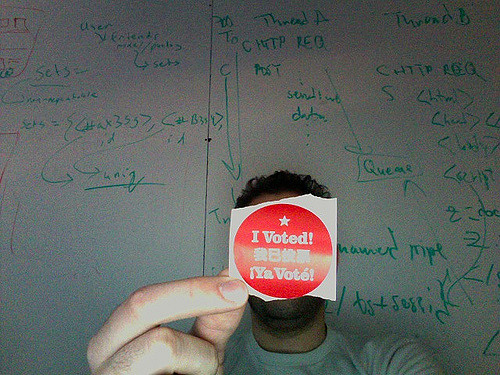While helping my grandson, who is a senior in high-school, with his civics homework, I thought, “It’s gotta be easy. After all, I graduated from high school. I know this stuff.”
Little did I know that helping him would end up being one of the most rewarding conversations about politics that I’ve had in a long time.
“Okay, Nana,” my grandson said. “The teacher wants us to write a paper on what influences our party affiliation and who we would vote for.”
“We’re supposed to focus on what he calls the six factors that influence political beliefs: family, gender, region, religion, education and ethnicity.”
My grandson started with how his father always voted a particular way and said that, “Well, my whole family votes that way. After all, he’s the dad.”
As he spoke I remembered the first time I actually voted against my own father.
It was a milestone for me, a defining moment in which I felt that I was stepping into my own adulthood and out from under my father’s influence.
Then my grandson said that since most of the people in his religion vote a certain way, he would vote the same way. I told him he better google that claim before he put it in his paper. The idea, that voting a certain way could make a person feel like they were a member of the club didn’t escape me.
As we went through the rest of the influences, I recognized in my own mind just how much of a role family, gender, region, religion, education, race/ethnicity had affected my own thinking over the years.
For example, I have spent 47 years in a small pocket of Blue in a Red State. Around me—in the cafes, in the local papers, in my neighborhood—is more Blue talk than Red. To talk Red in this cultural milieu could make a person feel like an outsider.
I hadn’t thought of it before, but where I live has probably affected my political thinking.
Going through the list with my grandson opened my eyes to, how I vote and the influences around me that don’t have a thing to do with, for example, Clinton’s e-mails.
They were instead the reasons that have influenced me over time to think out of one platform over the other—and to approach my voting from those perspectives.
“Why do you vote, Nana?” my grandson finally asked me when the paper was done. “I mean, do you think your vote even counts?”
Interesting question—one that many young people are asking today.
Do I vote because I’ve always voted?
Because I want to feel a sense of belonging to my community?
Because of what one party or the other says about my gender?
Because of the gender of the person running?
Do I vote because of the political platform of a particular party?
The thing is I didn’t used to vote.
I had lots of reasons that were pretty much the same as other’s people reasons: my vote didn’t count, I didn’t understand politics and it was all a big game that was going to go on without me.
Ironically enough though, when I did begin to vote on a regular basis, none of those reasons changed.
Another reason however, came to my consciousness that overrode them, and when my grandson asked, “Why do you vote, Nana?” I was able to answer his earnest question from a different perspective entirely—from the perspective that almost didn’t even take politics into consideration.
Here’s what I told him.
I vote because it is an opportunity to express myself as an individual.
I vote because it’s me I’m taking to the ballot box not, what I was taught in school or from the pulpit or even from my father.
I vote because voting is not about e-mails or even about grabbing women inappropriately—it’s about me having grown into my fullness and knowing my own mind.
It’s about making my outsides match my insides.
I also vote because all of the people I admire vote.
And finally, I vote to express what I value, and what I want for the world.
“When I vote from that perspective,” I said, “My vote matters to me—the person to whom it means the most—and it always counts.”
My grandson didn’t quite ace his paper and I’m not even sure he got as much out of the subject as I did. But he’s 17 years old. The time for getting a lot out of a subject is yet to come—when he looks back on it.
Hopefully, he learned something from the work we did together and he learned it without me merely being another “influencing factor.”
Author: Carmelene Siani
Image: jm3 / Flickr; Michael Bentley/Flickr
Editor: Sara Kärpänen







Read 0 comments and reply